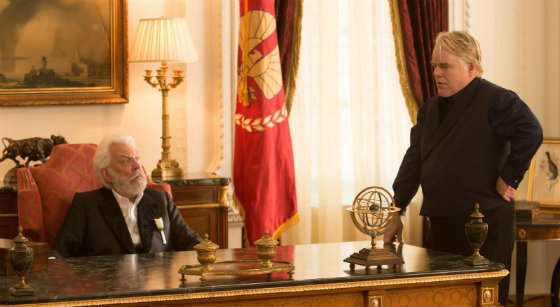I’m not particularly a fan of the Hunger Games series. I find the story too often revels in the savagery it portrays. However, I did find the newest film Catching Fire a marked improvement over the first movie. In addition to what I believe is a greater coherence and development within the plot, Catching Fire actually manages to be somewhat poignant, a quality the first film tried but failed to achieve. 
Philip Seymour Hoffman’s character has a conversation with main antagonist Donald Sutherland that is the best example of what I’m talking about. The two men are discussing how to ruin heroine Katniss without actually making a martyr of her. President Snow (Sutherland) greatly desires to have Katniss killed, but Hoffman suggests a better way: SImply juxtapose incessant media coverage of Katniss’s life with coverage of mass killings, starvation, and tyranny. The idea is that the people who now support Katniss will associate her, merely through the editing process, with their suffering.
I do not know for certain whether Hunger Games author Suzanne Collins is targeting American media with this dialogue. What seems unarguable, however, is that such a description of the power of suggestion is explicitly relevant to how our news culture communicates. Collins understands, as media moguls do, the power of images, and the capacity of images to tell a story without uttering words. Without any propositional or rhetorical argument being presented, the antagonists of the Hunger Games can raise opposition to an individual, simply by choosing in what sequence to show certain things.
Media suggestiveness is a powerful thing. I think Collins understands this better than Alex Edelman. Edelman, in (rightly) chastising political advertising for “condescending” towards Millenials, underestimates the extent to which a media that routinely preaches sermons through the cutting room floor can actually affect the way generations think about reality. It is actually possible (and at this point, maybe even likely) that many 16 and 17 year olds do form their philosophical, political, or even religious beliefs because of memes, viral videos, or sitcoms. And not one of those kids could probably remember ever being preached at.











